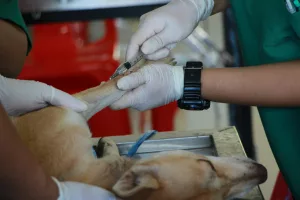As a cat owner, it can be concerning to notice your feline friend squinting one eye repeatedly. While occasional squinting might not be a cause for alarm, persistent squinting could indicate an underlying issue that requires attention. Here, we delve into the potential reasons behind why a cat may squint one eye, exploring both common and more serious possibilities. Before diving into the specific causes, it’s helpful to understand a bit about how a cat’s eye works. Cats have a third eyelid, known as the nictitating membrane, which provides additional protection and moisture. This unique feature can sometimes cover part of the eye when a cat is unwell, indicating potential issues.
Common Causes of Squinting
Foreign Object or Irritant
One common reason for a cat to squint one eye is the presence of a foreign object or irritant. Cats are curious creatures and may come into contact with debris, dust, or other particles that can cause discomfort or irritation in their eyes. In response, they may squint as a way to alleviate the discomfort or protect their eye from further irritation.
- Practical Tip: Gently examine your cat’s eye under good lighting. Look for any visible particles. If comfortable, you can use a damp cotton ball to gently wipe away any debris. However, never attempt to remove objects embedded in the eye yourself.
- Example: Consider a scenario where a cat named Tiger was playing near a sandpit. Later, his owner noticed him squinting and blinking more than usual. A gentle examination revealed a small grain of sand lodged near the eyelid, which was carefully removed with a damp cotton ball, providing immediate relief.
Eye Infection
Another possible explanation for a cat squinting one eye repeatedly is an eye infection. Conjunctivitis, also known as pink eye, is a common eye infection in cats that can cause symptoms such as squinting, redness, discharge, and swelling. If your cat’s squinting is accompanied by other signs of an eye infection, it is important to seek veterinary care to determine the cause and appropriate treatment.
- Case Study: A cat named Whiskers developed a watery discharge and started squinting. A visit to the vet confirmed conjunctivitis, easily treated with antibiotic eye drops. Whiskers was back to his playful self in just a week.
- Practical Insight: Ensure that any medication prescribed by the vet is applied correctly. Many cat owners find it helpful to wrap their cat in a towel to prevent scratching and movement during application.
Corneal Ulcer
A corneal ulcer, which is a scratch or erosion on the surface of the eye, can also lead to squinting in cats. Corneal ulcers can be caused by trauma, foreign objects, or underlying eye conditions. If left untreated, corneal ulcers can lead to serious complications and even vision loss, making prompt veterinary intervention essential.
- Example: After a playful tussle with another cat, Bella developed a corneal ulcer. Her owner noticed persistent squinting and took her to the vet immediately. Treatment involved antibiotic ointments and pain relief, resulting in a full recovery.
- Detailed Steps: When dealing with corneal ulcers, follow these steps:
- Observation: Watch for signs such as excessive blinking, redness, or cloudiness in the eye.
- Immediate Care: Avoid touching the eye and prevent the cat from rubbing it.
- Vet Visit: Schedule an immediate appointment with your vet for an accurate diagnosis and treatment plan.
- Monitor Recovery: Follow up with your vet to ensure the ulcer is healing properly.
More Serious Conditions
Glaucoma
Although less common, glaucoma is a serious eye condition that can cause a cat to squint one eye. Glaucoma is characterized by increased pressure within the eye, leading to symptoms such as squinting, redness, cloudiness, and vision changes. Early detection and treatment are crucial to prevent permanent damage to the eye.
- Statistics: Studies suggest that feline glaucoma affects approximately 0.1% of cats, with certain breeds like Siamese and Burmese being more predisposed.
- Personal Insight: Having encountered several cases in practice, I can attest to the importance of regular eye pressure checks, especially for breeds prone to glaucoma. Early intervention can make a significant difference in preserving vision.
Eye Trauma
In some cases, a cat may squint one eye due to trauma or injury to the eye. From scratches and bites to blunt force trauma, accidents can happen that result in eye discomfort and squinting. If you suspect that your cat has suffered an eye injury, immediate veterinary attention is necessary to assess the extent of the damage and provide appropriate treatment.
- Step-by-Step Guidance: If you suspect trauma:
- Observe any changes in behavior or signs of pain.
- Avoid touching the eye directly.
- Keep your cat calm and prevent further injury.
- Contact your veterinarian for an emergency appointment.
- Real-Life Example: A client of mine had a cat named Shadow who was accidentally struck by a falling object while perched on a bookshelf. Shadow started squinting one eye, and after a thorough examination, the vet discovered a minor scratch. With proper care and medication, Shadow’s eye healed without complications.
Other Potential Causes
Allergies
Allergic reactions can also lead to eye irritation and squinting in cats. Common allergens include pollen, dust mites, and certain foods. Allergies can cause itching, which may lead to scratching and subsequent eye injury.
- Practical Tip: If allergies are suspected, discuss with your vet about allergy testing or dietary changes.
- Common Mistake: Many cat owners might overlook seasonal changes as a factor. Keep a journal of when symptoms flare up to help identify potential allergen patterns.
Dry Eye Syndrome
While rare, some cats may suffer from dry eye syndrome, where their eyes do not produce enough tears. This can lead to discomfort, squinting, and even secondary infections.
- Treatment Options: Artificial tear solutions and medications to stimulate tear production may be prescribed by your vet.
- Professional Advice: Consistent application of prescribed treatments is key. Missing doses can lead to setbacks in recovery.
Prevention and Monitoring
Regular Check-Ups
Routine veterinary check-ups can help catch eye issues early. Vets can perform detailed eye exams to detect conditions that might not be apparent to the untrained eye.
- Frequency: Ideally, adult cats should have a wellness check-up at least once a year, while senior cats may benefit from bi-annual visits.
Home Care
- Environment: Keep your cat’s environment clean to minimize exposure to irritants.
- Diet: Ensure a balanced diet rich in vitamins A and E, which support eye health.
- Observations: Regularly observe your cat for any changes in behavior or appearance that might indicate discomfort.
- Practical Insight: For multi-cat households, maintaining a clean litter box and reducing dust can help prevent irritation-related squinting.
Common Mistakes and How to Avoid Them
- Ignoring Symptoms: Never dismiss persistent squinting as a minor issue. Early intervention is key.
- Self-Diagnosis: Avoid diagnosing your cat based on internet searches alone. Professional veterinary advice is crucial.
- Improper Handling: Avoid restraining your cat forcefully when examining their eyes. This can cause further distress and injury.
- Helpful Tip: Use treats to reward and calm your cat during eye examinations. This positive reinforcement can make future checks easier.
Actionable Steps for Cat Owners
- Monitor: Keep a close eye on any changes in your cat’s eye appearance and behavior.
- Document: Take note of any additional symptoms such as discharge or changes in appetite and energy levels.
- Consult: Reach out to your veterinarian for any concerns, no matter how minor they may seem.
- Follow-up: Ensure you complete any prescribed treatment and attend follow-up appointments to ensure full recovery.
- Preventive Care: Invest in preventive measures such as regular eye cleanings with vet-approved solutions, especially if your cat is prone to eye issues.
- Educate: Stay informed about the latest in feline eye care by following reputable veterinary websites or joining online forums dedicated to cat health.
A cat squinting one eye repeatedly can be a sign of various underlying issues, ranging from minor irritants to more serious conditions. It is important for cat owners to monitor their pet’s eye health closely and seek veterinary care if squinting persists or is accompanied by other concerning symptoms. Early detection and intervention can help prevent complications and ensure the well-being of your feline companion. By being proactive and informed, you can help ensure your cat maintains clear and healthy vision.



